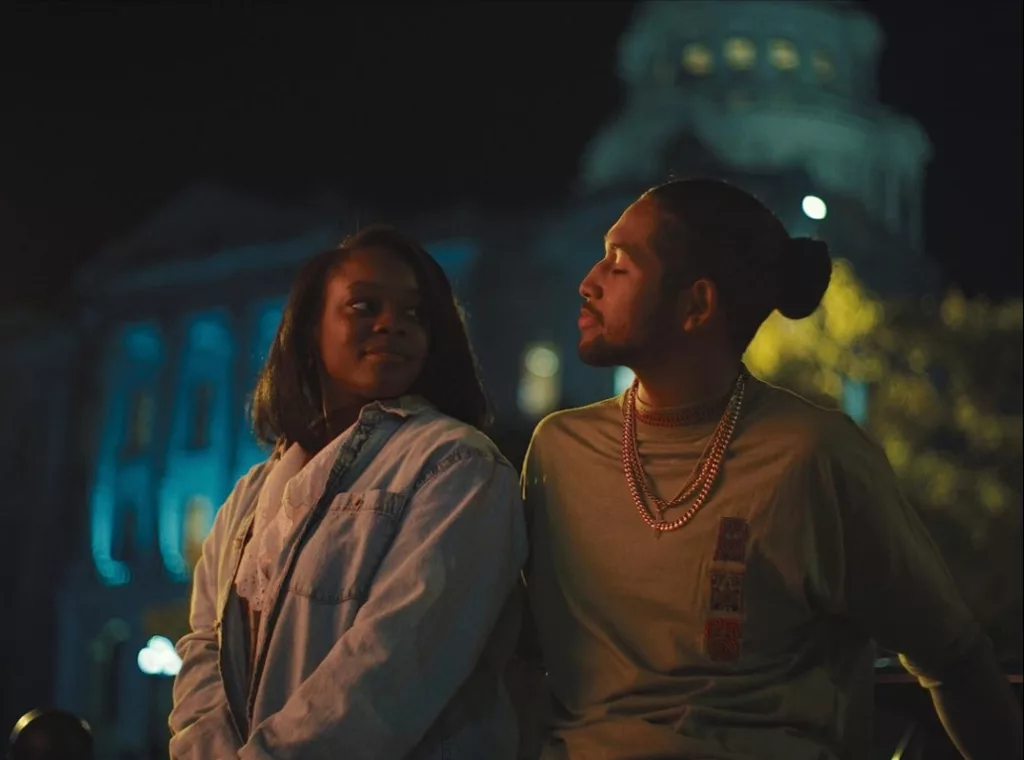Director Nicki Micheaux’s debut feature “Summer of Violence” follows Naomi, a recent college graduate navigating her transition to adulthood against the turbulent backdrop of 1990s Denver.
As gang violence tears at the social fabric of her new home, Naomi abandons the safe legal career path prescribed by her parents to pursue her true passions of poetry and community organizing.
In doing so, she embraces an existential journey of self-actualization that calls to mind the protagonists of classic coming-of-age films like Kubrick’s “Full Metal Jacket” – though with a distinctive feminine grace.
This review will examine how Naomi’s poetic spirit fuels her fight for meaning amidst turmoil, and society’s growing pains towards recognizing humanity in all its forms.
A Poetic Vision of Identity
With Summer of Violence, director Nicki Micheaux presents her refined poet’s eye in debuting behind the camera. Like a lyric to the struggles of self-discovery, Micheaux crafts Naomi’s harrowing summer as a carefully woven bildungsroman – a “coming of age” story for the societally conscious.
She elevates character over crisis, granting emotional gravitas to even minor roles through nuanced scripting that Scorsese would praise.
Micheaux establishes a thematic dichotomy from the first frames, juxtaposing Naomi’s fanciful poems against her harsh environmental factors with subtle style befitting this “film designed to be felt more than analyzed.”
Throughout, the screenplay probes identity as a mosaic we piece together, blurring lines of the roles society forces upon us versus our own design. In troubling boyfriend Richie, for example, she leaves room for complexity where others might push simplistic depiction.
Ultimately, Micheaux’s deft hand presents the summer’s violence as a challenge to self-actualization – to emerge whole, as Naomi does, having fused dream with reality through the timeless humanism of artistic expression.
Poetic Portraits of the Soul
From her introduction, Kasey Inez commandeers the screen with a complexity of emotion befitting her character’s turbulent trials. Inez imbues Naomi with a sensitive vulnerability and fierceness of spirit that, like the poems she weaves, leave a profound imprint.
Despite pressures to conformity, her Naomi refuses reduction to stereotype – a gritty authenticity echoing the complex women of The Wire.
Inez blossoms into her role with a fierce grace suggesting she, too, has endured growing pains. Hers is a breakthrough turn certain to inspire many daring to translate private pains into public art.
Damon Gupton and Madhulika Krishnan bring nuanced humanity to supportive roles that, in lesser hands, risk flattening. Gupton evinces the protective steel beneath a father’s love, warming to change through hard-earned empathy.
Krishnan offers Pam’s caring spirit and creeping disillusion in sparse, poignant brushstrokes. Their dynamic performances bolster a film unafraid to honor messy truths over tidy resolutions.
Indeed, Micheaux’s acute direction draws soulful work from all. Like Naomi’s poetry, these artistic translations transform mere summary into a visceral journey of self-reflection.
Ultimately, the talent gathered breathes vivacious life into tough subject matter, reflecting our shared struggles for purpose within an unfair world – and how even darkness holds beauty, if we find the courage to share our light.
A Poetic Visual Feast
Ben Kitchens’ cinematography imbues Summer of Violence with the soulful beauty of a Blake poem. His lush imagery transports us effortlessly between harsh realism and flickers of romanticism.
Like the adroit visual storytellers of Scorsese’s oeuvre, Kitchens grants us fleeting glimpses into lived experience through deftly framed vignettes that feel universal in their emotional resonance.
The restrictive framing evokes Naomi’s suffocating societal boxes, opening like her imagination into breathtaking panoramas as she blossoms. His fluid handheld work in intimate scenes echoes The Wire in its verisimilitude. Every frame is a poem in light and composition, whether bleak shadows hinting at abuse or joyous colors underscoring new love.
Symbolism abounds: nature blooming defiantly amid blight represents Naomi’s poetry refusing to wilt under violence. Warm candlelight suggests poetry’s power to illuminate our shared humanity, as community strengthens under its glow like Frank’s flames forging solidarity.
Perhaps most striking is the bold splash of red blood against white skin – a raw metaphor for the work remaining to erase racism’s stain.
Through his masterful visual storytelling, Kitchens raises an otherwise straightforward tale to lyrical heights that will inspire appreciation anew with repeated viewing. His participation ensures Summer of Violence a permanent place in cinematic history.
Poetic Insights on the Human Condition
Micheaux’s work resonates due to its exploration of universal themes through a lens of social progress. Naomi’s pursuit of dreams amid prescribed roles echoes Forrest Gump’s serendipitous journey through turbulent eras. Like The Wire, it dismantles reductive notions of “otherness” through nuanced characterizations that feel bracingly real.
A subtler theme examines the restrictive “boxes” thrust upon women of color, and Naomi’s refusal to be defined by surface attributes alone hints at her complexity within. Her poetry promotes reconciliation across differences, seen when her reading unites an uneven crowd – a message that, though delicate, carries Wire-like import.
On a personal note, Naomi’s artistic awakening and growing social consciousness parallel my own in the ’90s, fueled by Scorsese gems exposing brutal truths through layered storytelling.
Her evolution reminds that understanding begins by confronting biases within rather than attacking “others.” Ultimately, Summer of Violence sparks reflection on societal growing pains, encouraging appreciation of our shared humanity.
Micheaux’s poetic themes of finding purpose through compassion will resonate for generations. Her gift of insight ensures this debut a permanent place in analyzing the human condition through the timeless lens of story and art.
A Poignant Directorial Debut
With Summer of Violence, Nicki Micheaux establishes herself as a director of subtlety and grace. Like Scorsese’s measured touch in Taxi Driver, she navigates tough subject matter with a light directorial hand that prizes character over shock. Never does Micheaux sensationalize violence for its own sake; rather, she depicts its impacts with realism worthy of The Wire.
Scenes of Naomi’s unraveling feel painfully intimate, yet Micheaux maintains compassion. Her discerning eye frames tender moments between troubled individuals with beauty that stays long after – much as Frank’s hands shape art from unyielding metal.
At times, dialogue feels plucked verbatim from life, ringing with authentic regional flavor in a way Game of Thrones portraits inspire. In short, Micheaux’s debut hints at a singular voice in female filmmaking, skilled at crafting complex stories that resonate long after the final frame.
While her modest production merits praise, what remains most stunning is the bounty of creativity she coaxes from a threadbare tale – proof of a poet director’s gift we can expect to blossom in works to come. This viewer looks most eagerly to follow her journey.
A Poetic Work of Enduring Resonance
Through virtuosic performances, empathetic direction, and themes exploring the human spirit, Summer of Violence sings a song of hope that will echo long after its final frame.
In the lyrical traditions of works like Forrest Gump or The Shawshank Redemption, Micheaux crafts a moving portrait of the individual will to find purpose amidst turmoil. Her ensemble brings lived-in gravity to a tale displaying societal growth, much as The Wire anatomized with grace.
I admire Naomi’s story all the more for unpacking weighty issues around identity and community with delicate finesse befitting its poetic soul. In relegating shock for resonance, Summer of Violence emerges that rarer breed of film meant not merely to entertain, but to shape discourse and challenge preconceptions for generations.
If cinematic success is measured by a work’s ability to burrow fiercely into the mind’s recesses, this debut from Micheaux ensures its permanent residency there.
All readers would be remiss to overlook this gem any summer movie season. With Summer of Violence, Micheaux gifts viewers a visceral journey to cherish, demanding repeat visits to uncover sly nuances – much as I look forward to uncovering in future works from her imaginative pen. The film lives up to its name by infusing violence’s disruption with hopeful notes of human perseverance.
The Review
Summer of Violence
Summer of Violence is a lyrical and emotionally resonant work of art from a director with a singular poetic vision. Nicki Micheaux establishes herself as a storyteller of subtlety and grace, navigating heavy subject matter with sensitivity while bringing lived-in complexity to her fully realized characters. From its virtuosic performances to its enlightening exploration of identity and social progress, this film has earned a permanent place in examining the human condition through the timeless languages of poetry and cinema. While not without room for deeper analysis with repeated viewings, Summer of Violence delivers an profoundly moving tale that will burrow fiercely into the mind's recesses and demand returning to uncover sly nuances for years to come.
PROS
- Virtuosic and emotionally powerful performances from the entire cast
- Nicki Micheaux's subtle yet impactful directorial debut with an empathetic vision
- Poignant exploration of timely themes around identity, social barriers, and finding purpose
- Visually stunning cinematography that enhances the film's poetic soul
- Memorable protagonists and fully realized characters of all kinds
- Potential to spark thought-provoking discussion and shift perspectives
CONS
- Heavy subject matter may not appeal to all audiences
- Some challenging scenes depicting grief and trauma
- Occasional tonal shifts that feel a touch jarring



















































Discussion about this post